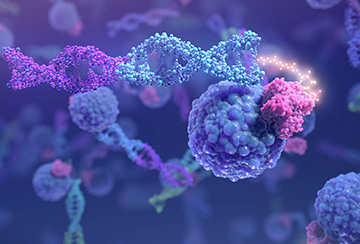Oncology has traditionally treated patients through combinations of surgery, chemotherapy, radiation therapy or immuno-oncology without the ability to consider the underlying genetics that individualize each patient’s cancer. Scientists and doctors now have the knowledge and tools to identify certain genetic mutations, or biomarkers, in some cancer cells that can be treated with targeted therapies. Yet, even with the availability of these precision medicines, the one-size-fits-all approach of non-targeted therapies remains the standard of care for a majority of patients.
As the era of precision medicine emerges, a key question among oncologists and biotechnologists alike is how to streamline and improve biomarker testing for more patients. Greater access to biomarker testing can empower doctors to provide the most beneficial treatments for the molecular underpinnings of an individual patient's disease, ensuring more patients get the right treatments at the right time, throughout their cancer journeys.
The rapid growth of precision medicine
The medical landscape is evolving, and precision medicine has become a vital focus of research for many areas of drug discovery. In 2018, the FDA approved a record-setting 25 personalized medicines, accounting for 42% of all new drug approvals. Nearly a quarter of these were personalized cancer medicines that target specific biomarkers or guide a patient’s care based on certain known genetic mutations.
As more targetable biomarkers are identified, and the number of available targeted therapies for these biomarkers continues to expand, doctors need clear guidance and access to the tools that ensure they can provide patients with truly personalized cancer care.
Educating doctors and patients about this expanded knowledge of biomarkers, and ensuring they can recommend the most effective treatment plan available, has the potential to significantly improve outcomes for many patients.
Expanded biomarker testing can improve patient outcomes
Early targeted therapies focused on just a handful of known genetic mutations and cancer types. Identifying the HER2 receptor in a breast cancer patient, for example, can inform treatment with both targeted therapies and certain standard chemotherapies known to induce responses in HER2-positive breast cancers.
The recent, accelerating expansion of scientific knowledge about genetic drivers has uncovered promising biomarkers in an ever-widening range of cancer types. This includes many with high unmet need, such as melanoma, for which 5-year survival rates have gone from less than 10% to over 50%.
Lung cancer, another area of high unmet need and a leading cause of cancer death, was long thought to have just two histologies. Scientists can now identify more than 10 variants. Among patients with advanced non-small cell lung cancer (NSCLC), there are many agents approved or under investigation for targets such as EGFR, ALK, BRAF, ROS1, RET, NTRK and KRAS(G12C). Five-year survival rates have significantly improved with the availability of biomarker testing and approved targeted treatments. Despite the evidence of potential for improved outcomes, 55% of advanced NSCLC patients carrying targetable biomarkers did not receive a targeted therapy in a 2019 study.
Coming together to bring precision medicine to more patients
Now that scientists have the technology to identify specific genetic mutations, and a growing number of treatments available to target them, expanding and improving biomarker testing can help bring targeted therapies and other precision medicines to more patients. Improved access to biomarker testing at the time of initial diagnosis can allow clinicians to use targeted therapies in the first lines of treatment, when available. Additionally, ongoing biomarker testing at different stages of a patient’s cancer journey show clinicians how the cancer is evolving so they can adapt the treatment plan to changes in the tumor’s DNA.
Precision cancer medicine has come a long way in a relatively short time, but there’s still more we can do to streamline and improve biomarker testing, including raising awareness among patients and doctors at the community hospital level, working with regulatory agencies to determine which tests should be approved, and collaborating with payers to make sure biomarker testing is covered by patient’s health plans.
On November 12, 2019, I-Fen Chang, Amgen’s Executive Medical Director of Global Oncology, participated in an Amgen-sponsored panel discussion about the importance, challenges and potential of biomarker testing in the age of precision medicine. Visit Atlantic Live’s People v. Cancer to learn more.



